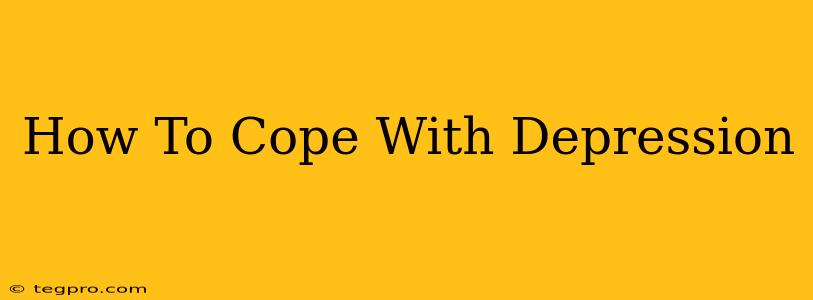Depression is a debilitating condition affecting millions worldwide. It's crucial to understand that you're not alone and that effective coping strategies exist. This guide provides practical steps to navigate depression and pave the way towards recovery. Remember, seeking professional help is a sign of strength, not weakness.
Understanding Depression
Before diving into coping mechanisms, it's essential to understand what depression is. It's more than just feeling sad. It's a mood disorder characterized by persistent feelings of sadness, loss of interest, and a range of other physical and emotional symptoms. These can include:
- Persistent sadness or low mood: A feeling of emptiness that lingers for extended periods.
- Loss of interest or pleasure: A lack of enjoyment in activities once found pleasurable.
- Changes in appetite or weight: Significant weight loss or gain, often without conscious effort.
- Sleep disturbances: Insomnia, sleeping too much, or restless sleep.
- Fatigue or loss of energy: Feeling constantly tired and lacking motivation.
- Restlessness or irritability: Feeling agitated, on edge, or easily frustrated.
- Feelings of worthlessness or guilt: Experiencing excessive self-criticism and negative self-perception.
- Difficulty concentrating, remembering, or making decisions: Struggling with cognitive functions.
- Recurrent thoughts of death or suicide: Having suicidal ideation or plans.
Effective Coping Strategies for Depression
Coping with depression requires a multifaceted approach. There's no one-size-fits-all solution, but these strategies can significantly improve your well-being:
1. Seek Professional Help: The Cornerstone of Recovery
This is arguably the most important step. A therapist or psychiatrist can provide a proper diagnosis, create a personalized treatment plan, and offer support throughout your journey. They can help you understand the underlying causes of your depression and develop strategies to manage your symptoms. Different types of therapy, such as cognitive behavioral therapy (CBT) and interpersonal therapy (IPT), can be particularly effective. Medication may also be necessary in some cases.
2. Lifestyle Adjustments: Nourishing Your Mind and Body
- Regular Exercise: Physical activity releases endorphins, which have mood-boosting effects. Even a short walk can make a difference.
- Healthy Diet: Nourishing your body with nutritious food provides the fuel it needs to function optimally. Limit processed foods, sugar, and caffeine.
- Sufficient Sleep: Aim for 7-9 hours of quality sleep per night. Establish a regular sleep schedule.
- Mindfulness and Meditation: Practicing mindfulness can help you become more aware of your thoughts and feelings without judgment, reducing stress and anxiety.
- Sunlight Exposure: Sunlight helps regulate your circadian rhythm and can improve mood. Spend time outdoors whenever possible.
3. Building a Support System: Connecting with Others
Depression can be isolating. Connecting with others is crucial.
- Talk to Trusted Individuals: Share your feelings with family, friends, or support groups.
- Join Support Groups: Connecting with others who understand what you're going through can provide valuable support and a sense of community.
4. Cognitive Restructuring: Challenging Negative Thoughts
Depression often involves negative and distorted thinking patterns. Cognitive restructuring techniques can help you identify and challenge these thoughts, replacing them with more realistic and positive ones.
5. Engage in Activities You Enjoy: Rediscovering Pleasure
When depressed, it's easy to withdraw from activities you once enjoyed. Make an effort to engage in hobbies, interests, or activities that bring you a sense of accomplishment or joy, even if it's just for a short time.
Maintaining Long-Term Well-being
Recovery from depression is a journey, not a destination. Relapses can occur, but with continued effort and support, you can manage your symptoms and live a fulfilling life. Remember to:
- Continue therapy and/or medication as prescribed.
- Practice self-care regularly.
- Maintain a strong support system.
- Celebrate your progress, no matter how small.
Disclaimer: This information is for educational purposes only and should not be considered medical advice. If you are struggling with depression, please seek professional help from a qualified mental health professional. You deserve support and care.

